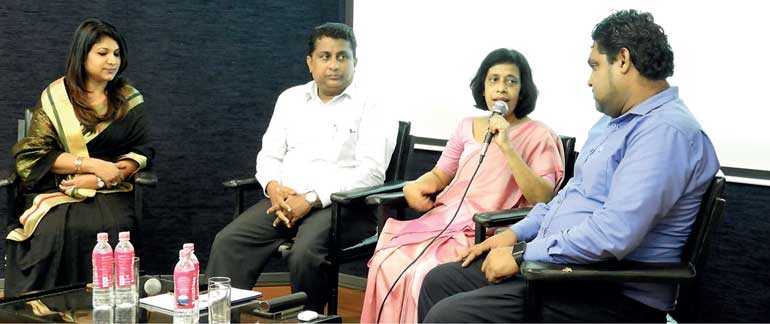Wednesday Feb 18, 2026
Wednesday Feb 18, 2026
Wednesday, 11 July 2018 00:00 - - {{hitsCtrl.values.hits}}
 Promoting a safety culture does not mean providing Personal Protection Equipment (PPE) alone. It is about creating a safety culture with a collective effort made by the State, industries and the general public, as the Director General of the National Institute of Occupational Safety and Health (NIOSH), Dr. Champika Amarasinghe pointed out at the recently-held HR-IR Forum initiated by the Employers’ Federation of Ceylon (EFC).
Promoting a safety culture does not mean providing Personal Protection Equipment (PPE) alone. It is about creating a safety culture with a collective effort made by the State, industries and the general public, as the Director General of the National Institute of Occupational Safety and Health (NIOSH), Dr. Champika Amarasinghe pointed out at the recently-held HR-IR Forum initiated by the Employers’ Federation of Ceylon (EFC).
The Forum was the second edition for 2018. Moderated by Dr. Amarasinghe, the panel at the HR forum comprised Gayan Fernando, Head of Health and Safety – Insee Cement, Nayani Peiris – Head of Employee Relations and Senior HRBP Supply Chain, Wellbeing Lead, Unilever Sri Lanka and Chameel Perera – Senior Industrial Relations Advisor, EFC.
Delivering the keynote address, Dr. Amarasinghe further remarked that occupational health (OSH) related accidents are on the rise. Citing the recent incidents including the ammonia tank explosion in Horana, she further noted that not all accidents are reported, hence statistical data available, does not indicate the real situation. Alerting the audience to the fact that ‘we are not a safety-oriented nation,’ OSH Chief reiterated that the ‘risk-taking behaviour’ culture can come at a high cost.
Attributing poor awareness of OSH among the general public, absence of OSH management systems in and risk assessments prior to executing tasks and negligence to the rising number of accidents to the increasing number of work-related accidents, Dr. Amarasinghe reminded that the interests of a company and employees should be balanced.
“Most CEOs are aware of the legal obligations affecting their organisation and what affects profitability, but often disregards the fact that happy employees are productive employees. In the light of this, HR arm has an obligation of communicating and promoting the importance of OSH within the organisation.”
Maintaining that very often OSH is viewed as a ‘burden’ without realising its positive implications to the organisation, Dr. Amarasinghe remarked that OSH management systems would assist organisations to improve their profitability standards.
Nayani Peiris, Head of Employee Relations and Senior HRBP Supply Chain, Wellbeing Lead, Unilever Sri Lanka remarked that safety standards were largely confined to the workplace, which should be ideally extended to outside the workplace. Gayan Fernando, Head of Health and Safety – Insee Cement attributed ‘poor risk-recognition practices’ to the work related accidents in the country.
Lobbying for an effective legal framework related to OSH, Chameel Perera – Senior Industrial Relations Advisor, EFC, maintained that the law-makers do not seem to be taking cognisance of OSH issues in the country. “For instance, when machinery with high safety features are imported to the country, they are heavily taxed by the authorities. Ideally such imports should be encouraged with incentives so that the imports of substandard equipment are discouraged.”
The EFC official also called for increased employee empowerment on OSH matters within an organisation. “Managers should be made accountable for commissions/omissions within their purview which result in accidents and thereby champion a safety culture within organisations.”
The HR IR Forum was also fuelled with the concerns and issues raised by the participants including poor safety standards, non-compliance with construction and building regulations and also sexual harassment at work which goes unreported most often, given the cultural fabric of the country. The event also called for enhanced awareness on work safety at school level which should be given muscle by the National Policy.